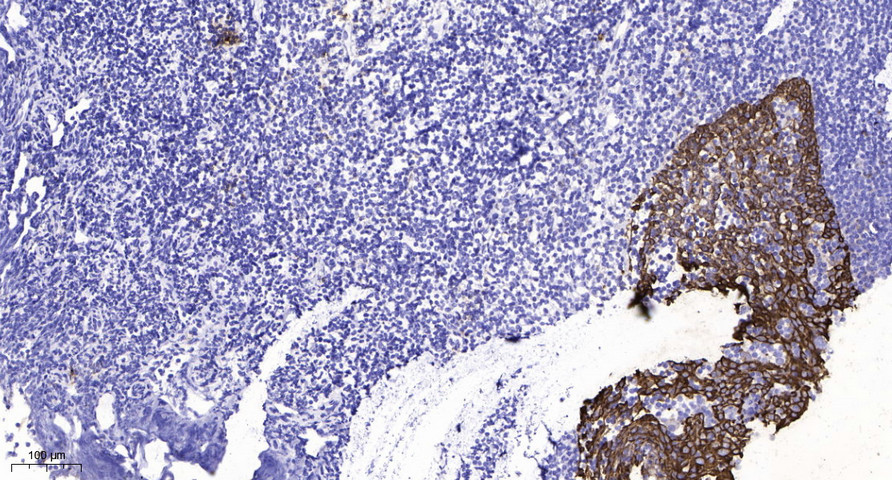GluR-2 (Phospho Tyr876) Polyclonal Antibody
- Catalog No.:YP1227
- Applications:IHC;IF;WB
- Reactivity:Human;Mouse;Rat
- Target:
- GluR-2
- Fields:
- >>cAMP signaling pathway;>>Neuroactive ligand-receptor interaction;>>Circadian entrainment;>>Long-term potentiation;>>Retrograde endocannabinoid signaling;>>Glutamatergic synapse;>>Dopaminergic synapse;>>Long-term depression;>>Amyotrophic lateral sclerosis;>>Huntington disease;>>Spinocerebellar ataxia;>>Pathways of neurodegeneration - multiple diseases;>>Cocaine addiction;>>Amphetamine addiction;>>Nicotine addiction
- Gene Name:
- GRIA2 GLUR2
- Protein Name:
- GluR-2 (Phospho-Tyr876)
- Human Gene Id:
- 2891
- Human Swiss Prot No:
- P42262
- Immunogen:
- Synthesized peptide derived from human GluR-2 (Phospho-Tyr876)
- Specificity:
- This antibody detects endogenous phospho levels of GluR-2 (Phospho-Tyr876) at Human:Y876, Mouse:Y876, Rat:Y876
- Formulation:
- Liquid in PBS containing 50% glycerol, 0.5% BSA and 0.02% sodium azide.
- Source:
- Polyclonal, Rabbit,IgG
- Dilution:
- IHC 1:50-200, WB 1:500-2000. IF 1:50-200
- Purification:
- The antibody was affinity-purified from rabbit serum by affinity-chromatography using specific immunogen.
- Concentration:
- 1 mg/ml
- Storage Stability:
- -15°C to -25°C/1 year(Do not lower than -25°C)
- Other Name:
- Glutamate receptor 2 (GluR-2;AMPA-selective glutamate receptor 2;GluR-B;GluR-K2;Glutamate receptor ionotropic, AMPA 2;GluA2)
- Observed Band(KD):
- 99kD
- Background:
- Glutamate receptors are the predominant excitatory neurotransmitter receptors in the mammalian brain and are activated in a variety of normal neurophysiologic processes. This gene product belongs to a family of glutamate receptors that are sensitive to alpha-amino-3-hydroxy-5-methyl-4-isoxazole propionate (AMPA), and function as ligand-activated cation channels. These channels are assembled from 4 related subunits, GRIA1-4. The subunit encoded by this gene (GRIA2) is subject to RNA editing (CAG->CGG; Q->R) within the second transmembrane domain, which is thought to render the channel impermeable to Ca(2+). Human and animal studies suggest that pre-mRNA editing is essential for brain function, and defective GRIA2 RNA editing at the Q/R site may be relevant to amyotrophic lateral sclerosis (ALS) etiology. Alternative splicing, resulting in transcript variants enco
- Function:
- function:Ionotropic glutamate receptor. L-glutamate acts as an excitatory neurotransmitter at many synapses in the central nervous system. Binding of the excitatory neurotransmitter L-glutamate induces a conformation change, leading to the opening of the cation channel, and thereby converts the chemical signal to an electrical impulse. The receptor then desensitizes rapidly and enters a transient inactive state, characterized by the presence of bound agonist.,miscellaneous:The postsynaptic actions of Glu are mediated by a variety of receptors that are named according to their selective agonists. This receptor binds AMPA (quisqualate) > glutamate > kainate.,PTM:Palmitoylated. Depalmitoylated upon glutamate stimulation. Cys-610 palmitoylation leads to Golgi retention and decreased cell surface expression. In contrast, Cys-836 palmitoylation does not affect cell surface expression but regul
- Subcellular Location:
- Cell membrane ; Multi-pass membrane protein . Endoplasmic reticulum membrane ; Multi-pass membrane protein . Cell junction, synapse, postsynaptic cell membrane ; Multi-pass membrane protein . Cell junction, synapse, postsynaptic density membrane ; Multi-pass membrane protein . Interaction with CACNG2, CNIH2 and CNIH3 promotes cell surface expression (By similarity). Displays a somatodendritic localization and is excluded from axons in neurons (By similarity). .
- Expression:
- Brain,
- June 19-2018
- WESTERN IMMUNOBLOTTING PROTOCOL
- June 19-2018
- IMMUNOHISTOCHEMISTRY-PARAFFIN PROTOCOL
- June 19-2018
- IMMUNOFLUORESCENCE PROTOCOL
- September 08-2020
- FLOW-CYTOMEYRT-PROTOCOL
- May 20-2022
- Cell-Based ELISA│解您多样本WB检测之困扰
- July 13-2018
- CELL-BASED-ELISA-PROTOCOL-FOR-ACETYL-PROTEIN
- July 13-2018
- CELL-BASED-ELISA-PROTOCOL-FOR-PHOSPHO-PROTEIN
- July 13-2018
- Antibody-FAQs
- Products Images

- Immunohistochemical analysis of paraffin-embedded human tonsil. 1, Antibody was diluted at 1:200(4° overnight). 2, Tris-EDTA,pH9.0 was used for antigen retrieval. 3,Secondary antibody was diluted at 1:200(room temperature, 45min).



